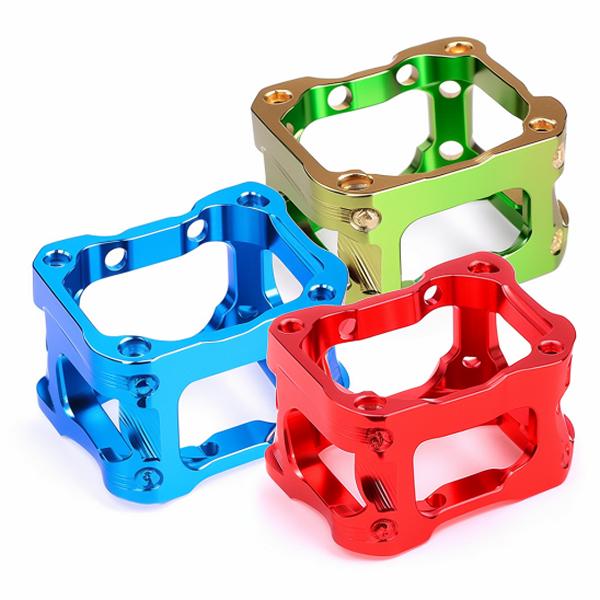Not known Details About Alcast Company
Table of ContentsLittle Known Facts About Alcast Company.Not known Details About Alcast Company Unknown Facts About Alcast CompanyAlcast Company - QuestionsEverything about Alcast CompanyExcitement About Alcast Company
Chemical Contrast of Cast Aluminum Alloys Silicon advertises castability by decreasing the alloy's melting temperature and boosting fluidness during casting. Additionally, silicon adds to the alloy's stamina and put on resistance, making it valuable in applications where toughness is important, such as automobile parts and engine parts.It also improves the machinability of the alloy, making it much easier to refine right into completed products. By doing this, iron adds to the overall workability of light weight aluminum alloys. Copper increases electrical conductivity, making it beneficial in electrical applications. It likewise boosts deterioration resistance and adds to the alloy's overall strength.
Manganese adds to the toughness of light weight aluminum alloys and improves workability (Aluminum Casting). It is typically utilized in functioned light weight aluminum products like sheets, extrusions, and accounts. The existence of manganese help in the alloy's formability and resistance to fracturing throughout manufacture procedures. Magnesium is a lightweight aspect that provides toughness and impact resistance to aluminum alloys.
The Greatest Guide To Alcast Company
Zinc enhances the castability of light weight aluminum alloys and aids manage the solidification procedure during casting. It improves the alloy's strength and solidity.

The main thermal conductivity, tensile toughness, return toughness, and elongation differ. Select appropriate basic materials according to the efficiency of the target product generated. Among the above alloys, A356 has the greatest thermal conductivity, and A380 and ADC12 have the most affordable. The tensile restriction is the opposite. A360 has the ideal yield stamina and the highest possible elongation price.
Not known Details About Alcast Company

In precision spreading, 6063 is well-suited for applications where elaborate geometries and top quality surface area coatings are critical. Examples include telecommunication units, where the alloy's remarkable formability enables streamlined and cosmetically pleasing styles while keeping structural stability. In the Lights Solutions industry, precision-cast 6063 elements create stylish and effective illumination fixtures that require intricate shapes and great thermal efficiency.
The A360 exhibits remarkable elongation, making it optimal for facility and thin-walled components. In accuracy spreading applications, A360 is appropriate for markets such as Consumer Electronic Devices, Telecommunication, and Power Tools.
Some Ideas on Alcast Company You Need To Know
Its unique residential properties make A360 a beneficial option for accuracy casting in these industries, boosting item toughness and quality. Light weight aluminum alloy 380, or A380, is a widely used spreading alloy with numerous distinctive attributes. It offers superb castability, making it an optimal selection for precision spreading. A380 displays good fluidity when molten, making certain complex and comprehensive molds are properly duplicated.
In accuracy spreading, light weight aluminum 413 shines in the Consumer Electronics and Power Devices sectors. This alloy's remarkable rust resistance makes it a superb option for outdoor applications, making certain lasting, sturdy products in the discussed sectors.
Alcast Company Fundamentals Explained
The light weight aluminum alloy you choose will considerably influence both the spreading process and the properties of the final product. Because of this, you have to make your decision very carefully and take an informed technique.
Figuring out one of the most appropriate aluminum alloy for your application will indicate weighing a broad array of qualities. These relative alloy features comply with the North American Pass Away Spreading Association's guidelines, and we have actually separated them into two categories. The first category addresses alloy qualities that impact the production process. The second covers qualities impacting the residential properties of the end product.
More About Alcast Company
The alloy you choose for die spreading straight influences numerous aspects of the spreading process, like how easy the alloy is to deal with and if it is vulnerable to casting flaws. Hot breaking, also referred to as solidification cracking, is a typical die spreading defect for light weight aluminum alloys that can lead to interior or surface-level tears or fractures.
Certain aluminum alloys are much more prone to hot fracturing than others, and your choice needs to consider this. One more usual defect discovered in the die spreading of light weight aluminum is die soldering, which is when the cast adheres to the die walls and makes ejection difficult. It can harm both the cast and the die, so you need to look for alloys with high anti-soldering buildings.
Rust resistance, which is currently a notable quality of light weight aluminum, can differ significantly from alloy to alloy and is an important characteristic to think about relying on the environmental problems your item will be exposed to (Casting Foundry). Wear resistance is another residential or Aluminum Casting commercial property typically sought in aluminum items and can differentiate some alloys